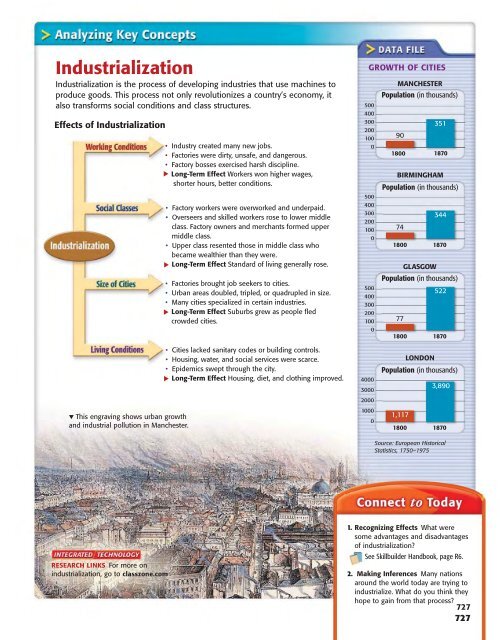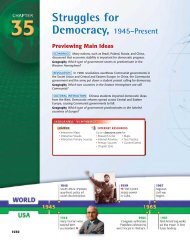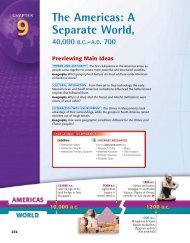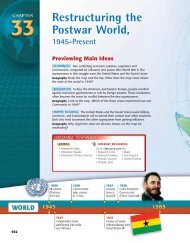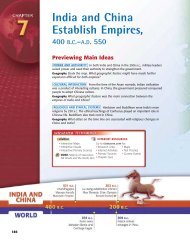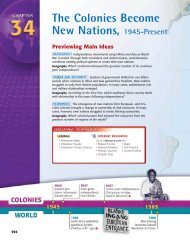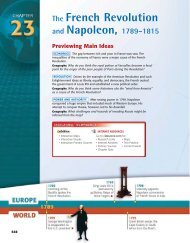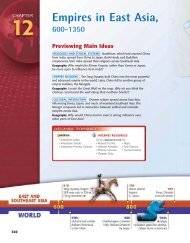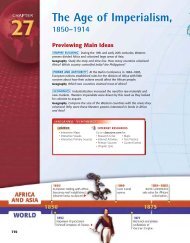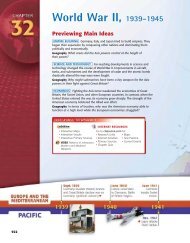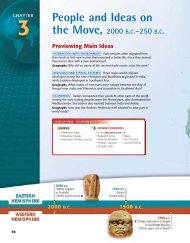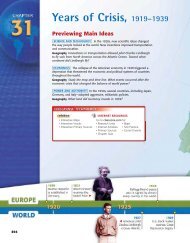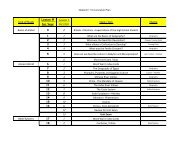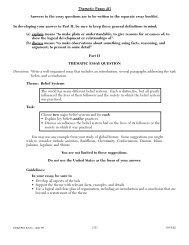The Industrial Revolution, 1700– 1900 Previewing Main Ideas
The Industrial Revolution, 1700– 1900 Previewing Main Ideas
The Industrial Revolution, 1700– 1900 Previewing Main Ideas
You also want an ePaper? Increase the reach of your titles
YUMPU automatically turns print PDFs into web optimized ePapers that Google loves.
<strong>Industrial</strong>ization<br />
<strong>Industrial</strong>ization is the process of developing industries that use machines to<br />
produce goods. This process not only revolutionizes a country’s economy, it<br />
also transforms social conditions and class structures.<br />
Effects of <strong>Industrial</strong>ization<br />
▼ This engraving shows urban growth<br />
and industrial pollution in Manchester.<br />
RESEARCH LINKS For more on<br />
industrialization, go to classzone.com<br />
• Industry created many new jobs.<br />
• Factories were dirty, unsafe, and dangerous.<br />
• Factory bosses exercised harsh discipline.<br />
Long-Term Effect Workers won higher wages,<br />
shorter hours, better conditions.<br />
▼<br />
• Factory workers were overworked and underpaid.<br />
• Overseers and skilled workers rose to lower middle<br />
class. Factory owners and merchants formed upper<br />
middle class.<br />
• Upper class resented those in middle class who<br />
became wealthier than they were.<br />
Long-Term Effect Standard of living generally rose.<br />
▼<br />
• Factories brought job seekers to cities.<br />
• Urban areas doubled, tripled, or quadrupled in size.<br />
• Many cities specialized in certain industries.<br />
Long-Term Effect Suburbs grew as people fled<br />
crowded cities.<br />
▼<br />
• Cities lacked sanitary codes or building controls.<br />
• Housing, water, and social services were scarce.<br />
• Epidemics swept through the city.<br />
Long-Term Effect Housing, diet, and clothing improved.<br />
▼<br />
GROWTH OF CITIES<br />
500<br />
400<br />
300<br />
200<br />
100<br />
0<br />
500<br />
400<br />
300<br />
200<br />
100<br />
0<br />
500<br />
400<br />
300<br />
200<br />
100<br />
0<br />
4000<br />
3000<br />
2000<br />
1000<br />
0<br />
MANCHESTER<br />
Population (in thousands)<br />
90<br />
1800<br />
74<br />
1800<br />
351<br />
1870<br />
BIRMINGHAM<br />
Population (in thousands)<br />
77<br />
1800<br />
GLASGOW<br />
344<br />
1870<br />
Population (in thousands)<br />
522<br />
1870<br />
Population (in thousands)<br />
1,117<br />
LONDON<br />
3,890<br />
1800 1870<br />
Source: European Historical<br />
Statistics, 1750–1975<br />
1. Recognizing Effects What were<br />
some advantages and disadvantages<br />
of industrialization?<br />
See Skillbuilder Handbook, page R6.<br />
2. Making Inferences Many nations<br />
around the world today are trying to<br />
industrialize. What do you think they<br />
hope to gain from that process?<br />
727<br />
727


